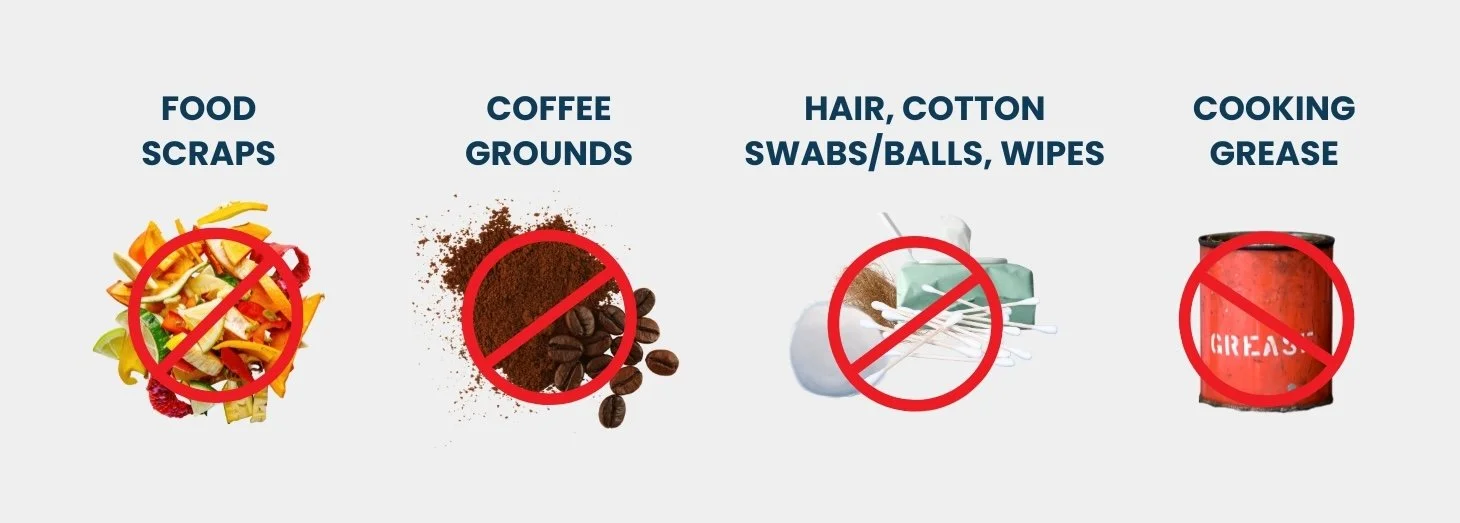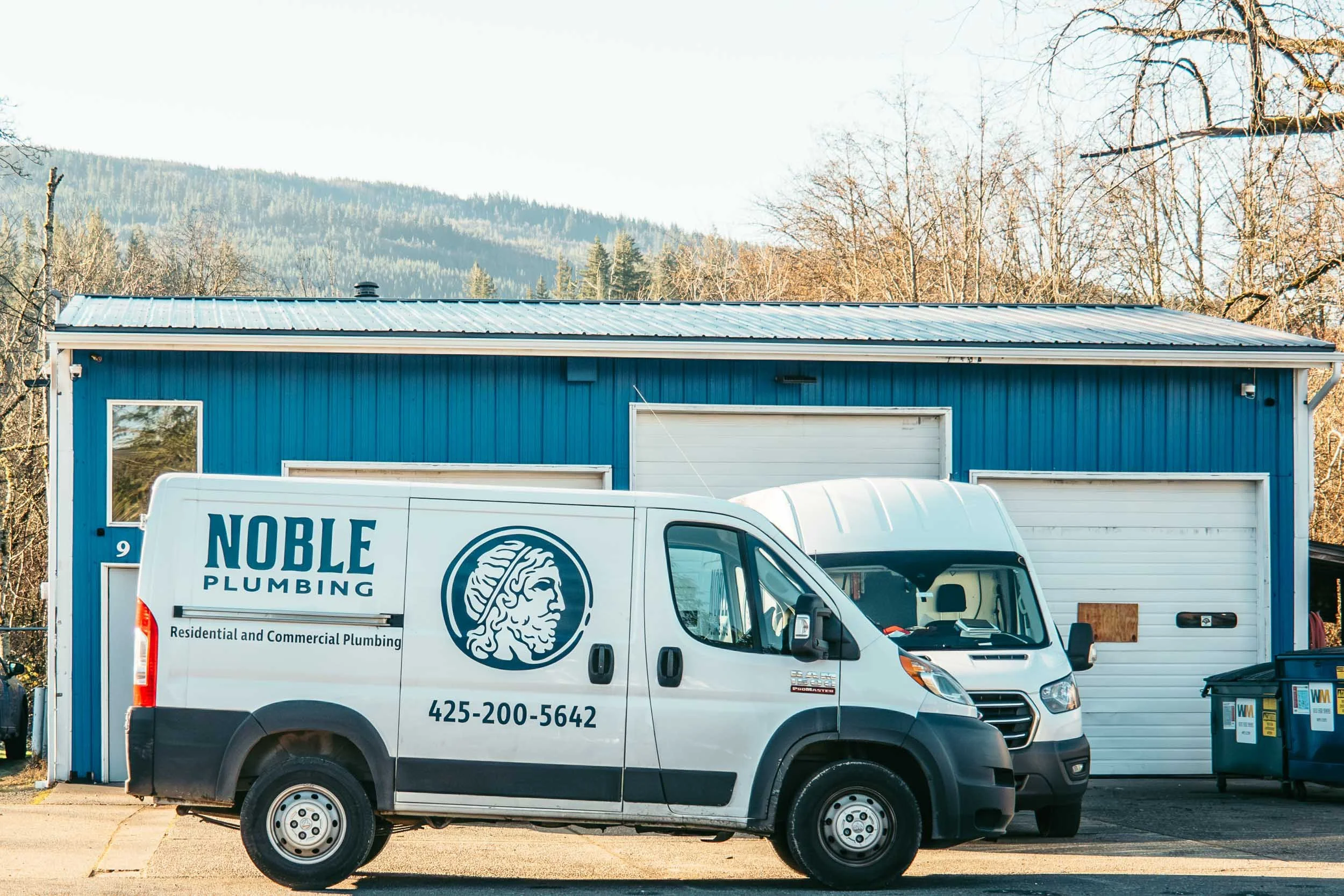4 Easy Tips to Avoid Drain Clogs & Navigate Hard Water Buildup
Clogged drains are a common reason homeowners in Issaquah, the Snoqualmie Valley, and nearby towns seek help. A slow or backed-up drain can lead to unpleasant odors, standing water, and sometimes more significant plumbing issues down the road.
The good news? By adopting a few simple habits, you can keep things flowing easily and avoid the need for emergency repairs. Here are some everyday ways to prevent drain clogs in your kitchen, bathroom, and beyond — plus a few signs it’s time to call in a pro.
Why do drains get clogged?
Understanding what causes clogs makes them easier to prevent. Some of the most common culprits include:
Hair – Especially in showers and bathroom sinks, where it mixes with soap scum.
Food Waste – Grease, oil, and kitchen scraps can harden in pipes, leading to blockages. It’s tempting to rinse it all away, but skipping the drain screen cleaning can add up over time.
Soap Scum – Layers of soap residue can coat your pipes, catching more debris along the way.
Foreign Objects – Toothpaste caps, jewelry, and cotton swabs are all small enough to sneak into drains.
Mineral Buildup – Homes around areas like Snoqualmie may experience moderately hard water, leading to the buildup of minerals like calcium that can narrow your pipes.
Avoid Drain Clogs
1. Use Drain Screens
Pop a simple mesh or perforated drain screen in your sinks and showers to catch hair and food before they cause trouble. They’re cheap, easy to clean, and you can find them at just about any hardware store or grocery store.
Pro tip: Empty them often; taking a few extra seconds to empty the screen can keep things running smoothly and save your wallet in the long run.
2. Be Mindful of What Goes Down the Drain
A few quick swaps can make a big difference.
In the Kitchen:
Grease and Oil: Let it cool, then toss it in the trash instead of the sink.
Food Scraps: Scrape plates into the compost or trash before rinsing.
Coffee Grounds & Starchy Foods: These love to stick to pipes and can create stubborn clogs.
In the Bathroom:
Hair: Brush your hair before hopping in the shower to catch loose strands that are likely to get caught in your drain.
Non-Flushable Items: Things like wipes, floss, cotton balls, and sanitary products belong in the trash, not the toilet.
3. Run Hot Water Regularly
Once a week, run hot tap water (not boiling) down your drains to help clear away light buildup from grease or soap. After doing dishes, let the hot water run for about 30 seconds to flush the line and prevent residue from settling.
Note: Avoid boiling water if you have PVC pipes, as it can warp and damage them. Stick with hot tap water (around 120–140°F).
4. Use Natural Cleaners
Skip the harsh chemical drain cleaners. They can erode your pipes and are also harmful to the environment. Instead, use a simple homemade cleaner with ingredients you probably already have around the house.
Pour ½ cup of baking soda down the drain.
Add ½ cup of white vinegar.
Let it fizz for 15–20 minutes.
Rinse with hot water.
This combo breaks down organic buildup like grease, soap scum, and food particles, helping to clear minor clogs and freshen the drain.
When to Call for Backup
Even with regular care, some clogs need a professional fix. It might be time to call if you notice:
Water is backing up in more than one drain
Gurgling noises coming from sinks or toilets
A lingering smell that won’t go away
Slow draining that keeps coming back
If you’re in Issaquah, Snoqualmie, North Bend, or the surrounding areas in Greater King County, we can help. Our team uses professional tools like camera inspections and hydro-jetting to clear stubborn blockages safely, with no harsh chemicals and no guesswork.
About Hard Water
Many homes use hard water, which contains minerals that can slowly build up inside pipes. Over time, this can cause reduced water pressure and slower drains. If you notice white spots on faucets or buildup in your showerhead, hard water might be the cause. We can test your water and talk about options like filtration or softening systems to help protect your plumbing long-term.
Water In Our Region
Water hardness varies across our region. For Issaquah and nearby areas served by the Cascade Water Alliance, hardness levels are generally on the soft to moderately soft side according to City of Issaquah water reports.
In Snoqualmie and the surrounding parts of the valley, water tends to be moderately hard, as noted by the City of Snoqualmie. Nearby communities, such as Sammamish, Maple Valley, and Fall City, also receive water from Cascade Water Alliance or local sources with similar results.
Check out your local water report to learn more about the water quality in your specific area.
Keep Things Flowing with Noble Plumbing
Preventing clogs mostly comes down to small daily habits and knowing when to seek a little extra help. Whether you’re dealing with a slow drain or a bigger plumbing issue, Noble Plumbing is here for our neighbors in Issaquah, the Snoqualmie Valley, and beyond.
📞 Call (425) 200-5642 or schedule an appointment online anytime. We’re always happy to help you keep things flowing smoothly.






